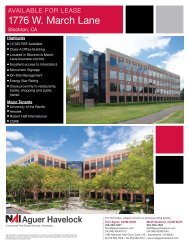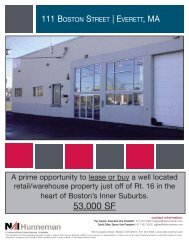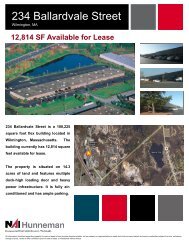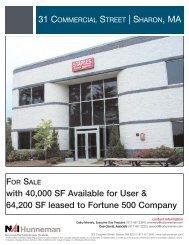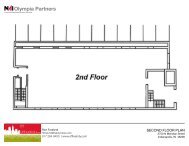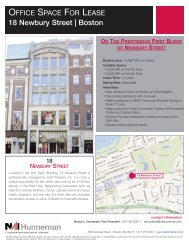2012 Global Market report - NAI Global
2012 Global Market report - NAI Global
2012 Global Market report - NAI Global
You also want an ePaper? Increase the reach of your titles
YUMPU automatically turns print PDFs into web optimized ePapers that Google loves.
thereof). Slowed real estate activity during Q2 2011 was quite strong overall, with rent<br />
and sale prices increasing by about 8%. For <strong>2012</strong>, rental and sale activity should remain<br />
strong in all sectors, especially retail. Numerous retail projects are under construction<br />
and will be available in <strong>2012</strong>, with many already significantly pre-leased. In the Lima office<br />
market, demand should remain active and vacancy rates are not expected to drop as<br />
new office product is delivered. Due to the expansion of the city’s core, industrial<br />
development is being pushed further out beyond the residential and commercial areas,<br />
primarily to Huachipa in the East zone, Lurin and Chilca in South Lima; and Ventanilla in<br />
West Lima.<br />
Venezuela. 2011 proved to be a difficult year again for Venezuela as the Chavez<br />
administration’s macro and microeconomic policies continued to chastise the domestic<br />
companies and markets. Additionally, lower oil prices and falling production reduced the<br />
government’s revenues, as the petroleum industry remains the most important and<br />
profitable economic engine. <strong>2012</strong> will continue to be difficult with shortages expected in<br />
many sectors, due to the administration’s nationalization of numerous companies and<br />
its continued threats to strategic industries, such as food processing and agriculture.<br />
Except for activity from political bedfellows such as Iran, China, Libya and Russia, there<br />
is virtually no new foreign investment in Venezuela outside of the petroleum industry, as<br />
the country’s administration and policy environment hamper recovery.<br />
Vacancy rates are still near zero in the office, industrial and retail sectors, and rental rates<br />
are rising sharply due to high inflation rates and artificially low dollar-to-bolivar currency<br />
exchange rates. Landlords determine sale and rental rates based on the US dollar.<br />
Although investors and developers remain extremely cautious due to the lack of<br />
transparency and political risks, there is some new development and investment in real<br />
estate, particularly in retail. Firms operating in Venezuela cannot expatriate their earnings<br />
at a realistic dollar value, and are therefore looking for an alternative way to protect the<br />
value of their capital, which could bode well for commercial property markets.<br />
<strong>2012</strong> <strong>Global</strong> <strong>Market</strong> Report n www.naiglobal.com<br />
23



